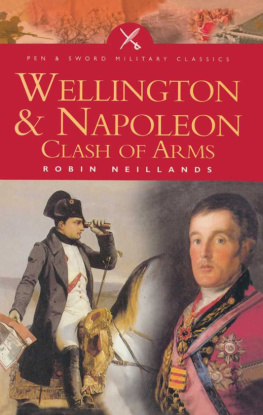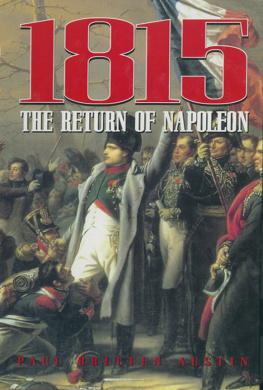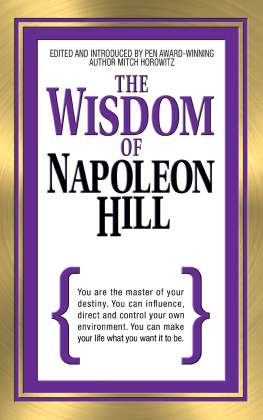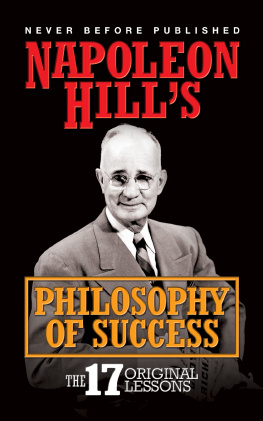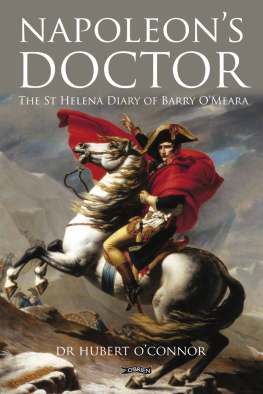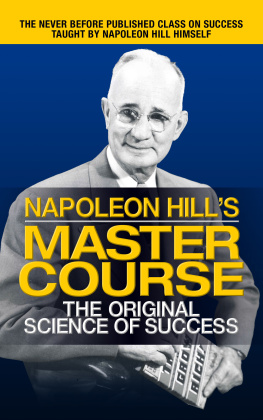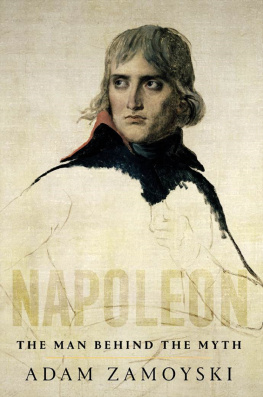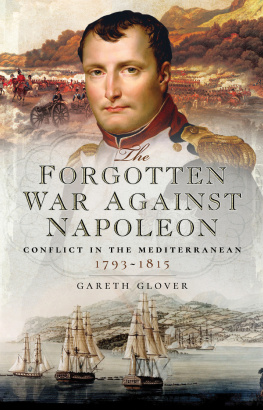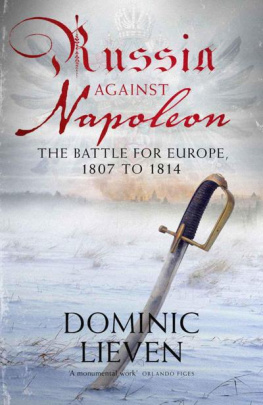Napoleon - Wellington and Napoleon: clash of arms, 1807-1815
Here you can read online Napoleon - Wellington and Napoleon: clash of arms, 1807-1815 full text of the book (entire story) in english for free. Download pdf and epub, get meaning, cover and reviews about this ebook. City: France;Great Britain, year: 2003, publisher: Pen & Sword Military Classics, genre: Non-fiction. Description of the work, (preface) as well as reviews are available. Best literature library LitArk.com created for fans of good reading and offers a wide selection of genres:
Romance novel
Science fiction
Adventure
Detective
Science
History
Home and family
Prose
Art
Politics
Computer
Non-fiction
Religion
Business
Children
Humor
Choose a favorite category and find really read worthwhile books. Enjoy immersion in the world of imagination, feel the emotions of the characters or learn something new for yourself, make an fascinating discovery.
- Book:Wellington and Napoleon: clash of arms, 1807-1815
- Author:
- Publisher:Pen & Sword Military Classics
- Genre:
- Year:2003
- City:France;Great Britain
- Rating:3 / 5
- Favourites:Add to favourites
- Your mark:
- 60
- 1
- 2
- 3
- 4
- 5
Wellington and Napoleon: clash of arms, 1807-1815: summary, description and annotation
We offer to read an annotation, description, summary or preface (depends on what the author of the book "Wellington and Napoleon: clash of arms, 1807-1815" wrote himself). If you haven't found the necessary information about the book — write in the comments, we will try to find it.
Wellington and Napoleon: clash of arms, 1807-1815 — read online for free the complete book (whole text) full work
Below is the text of the book, divided by pages. System saving the place of the last page read, allows you to conveniently read the book "Wellington and Napoleon: clash of arms, 1807-1815" online for free, without having to search again every time where you left off. Put a bookmark, and you can go to the page where you finished reading at any time.
Font size:
Interval:
Bookmark:
WELLINGTON
AND
NAPOLEON
Clash of Arms
18071815
Other books by the author
The Hundred Years War
The Wars of the Roses
By Sea & Land (The Royal Marines Commandos 194282)
The Raiders (The Army Commandos 194045)
The Desert Rats (The 7th Armoured Division 193945)
D-Day 1944: Voices from Normandy (with Roderick de
Normann)
The Road to Compostela
Armageddon: The Defeat of Germany 1945
WELLINGTON
AND
NAPOLEON
Clash of Arms
ROBIN NEILLANDS

Originally published in 1994 by John Murray (Publishers) Ltd.
Published in 2003, in this format, by
PEN & SWORD MILITARY CLASSICS
an imprint of
Pen & Sword Books Limited,
47, Church Street,
Barnsley,
S. Yorkshire,
S70 2AS
Robin Neillands 1994, 2003
ISBN 0 85052 926 3
A CIP record for this book is
available from the British Library
Printed in England by
CPI UK
For
Nigel Massey
of
The 45th Foot
For kind permission to reproduce these illustrations, thanks are due as follows: 1 and 2, National Portrait Gallery; 3, 9, 11, 15 and 28: Anne S. K. Brown Military Collection, Brown University Library; 5, 6, 12, 13, 16, 17, 18 and 20: Collection Philip J. Haythornthwaite and Cassell; 7, 19, 22 and 23: Hulton Deutsch; 14: The National Trust (Plas Newydd), photograph Courtauld Institute of Art; 21: Mansell Collection.
A great many people helped me with this book, so thanks to Dr David Chandler of the Royal Military Academy, Sandhurst, doyen of experts on the Napoleonic Wars, and to Captain and Mrs Snook of Holts Battlefield Tours for an informative visit to the battlefields of Spain and Portugal. Also to Nigel Massey at Waterloo, and Stephen Danos in Austria. Jack Jensen of Toronto, Canada, produced a goldmine of out-of-print books, as did that ever-helpful institution, The London Library. Thanks also to the curators and staff of military museums in Lisbon, Busaco, Coimbra, Madrid, to the Light Infantry Museum in Winchester and the National Army Museum in London. Lastly, and as ever, to Estelle Huxley, for typing numerous drafts and for her patience in holding the fort while I was away walking battlefields and enjoying myself.
My destiny is not yet accomplished. The picture as yet exists only in outline. There must be one code, one court of appeal, one coinage, for all Europe. The States of Europe must be melted into one nation, and Paris will be its capital.
Napoleon Bonaparte: 1812
THE DETERMINATION OF Napoleon Bonaparte, Emperor of the French, to impose his will on Europe and the determination of the other Powers but especially Great Britain to resist him, created a dramatic story which has kept historians busy for nearly two centuries.
An estimated 50,000 books have been written on Napoleon himself, and when all the others on his battles, his love affairs, his politics and philosophy, his campaigns, his opponents, and his allies have been added to the pile, the total must run into six figures. No year goes by without additions to the existing canon, and the shelves of any decent library groan under the weight of works on the Napoleonic Wars. Why, then, add another?
The first reason is personal: to learn more of that turbulent period in European history, by researching and writing about it. The complexities of the Napoleonic period have been clarified over the last few decades by the work of such historians as Corelli Barnett, John Naylor, Christopher Hibbert, Georges Lefebvre, Lawrence James, Elizabeth Longford, the late David Howarth, and my good friend David Chandler, until recently Head of the Department of War Studies at the Royal Military Academy, Sandhurst. All these have written about the period in an informed and entertaining manner, but the fact remains that for even an outline of the times, it is necessary to read a good many books. It therefore occurred to me that there might be room to capture in one volume the developing struggle between Napoleon and the most persistent and successful opponent of his aims, the Duke of Wellington culminating in their final clash at Waterloo. Those who seek greater detail are directed to the bibliography. My second reason is the belief that history is important because it teaches, as no other subject can, the brutal fact that actions have consequences a fact nowhere more clearly illustrated than in the last eight years of the Napoleonic era, from the Emperors triumph at Tilsit in 1807 to his final defeat at Waterloo in 1815. Napoleon Bonaparte was in decline during these eight years, despite his successes on the battlefield and at the conference table, and the reason for that decline may be summed up in one word Spain.
The British reader may care to add another Wellington but in the context of Europe at the time, Wellington was less important than many British history books imply. The Royal Navy, Austria, Prussia and, most notably, Russia, all played a more decisive role in the defeat of Napoleon and the disintegration of his Empire.
No one man played a more decisive part in the struggle than General Sir Arthur Wellesley, later Duke of Wellington. His clear-sighted strategy during the Peninsular War and his tactical successes on the battlefield enabled him to demonstrate time and again that the armies of France could be defeated. Again and again, his victories revived the spirits and the fortunes of the other Allied Powers and slowly chipped away at the legend of Napoleonic invincibility. Wellington could not have achieved all he did without the help of the British Fleet and the Spanish guerrillas. Against such a combination, Napoleon and his marshals struggled in vain.
Napoleon Bonaparte remains a great general. For that we have the word of his most doughty opponent. Field Marshal Wellington, who when asked for his opinion on this point, replied, In this age, in past ages, in any age, Napoleon. From a man who, as one of his soldiers remarked, did not know how to lose a battle, that opinion deserves consideration.
Napoleon Bonaparte had to be more than a great general. He had to be an Emperor, the ruler of Europe, a reformer, a creator of nations. His aim was to reduce all Europe to his will, and in this he overreached himself. In the end he fell like Lucifer, a victim of his own ambition.
The part played by the Spanish people and the Peninsular Army consisted largely of demonstrating that Napoleon could be defied. The Emperor was defeated by other nations, by Austria, Russia and Prussia but the final element contributing to his downfall was the Emperor himself. By going too far, by refusing to recognize that enough was enough, the Emperor continued to wage war until his armies were lost and his reputation in tatters.
The last eight years of the Napoleonic Empire saw the Hon. Arthur Wesley rise from being the most junior general on the Army List to Commander-in-Chief of the Armies of Portugal and Spain, Commander of the Peninsular Army, Field Marshal, Ambassador and, finally, Victor. This is the story of Napoleon and Wellington as it developed over those years, from the moment when their destinies became linked in the Peninsula to their sole encounter at Waterloo, seven years later.
1806
The British infantry are the finest infantry in Europe; fortunately there are not many of them.
Thomas Bugeaud,
Marshal of France: 1809
SHORTLY AFTER NINE oclock on the morning of 4 July 1806, General Sir John Stuarts leading companies finally pushed their way through the undergrowth cloaking the banks of the River Lamato and emerged onto the dusty plain of Maida. Before them was a sight that had already struck fear into half the armies of Continental Europe. Their musket barrels glinting in the sun, French soldiers were coming onto the attack, thick columns of infantry screened by sharpshooters, veteran troops driven onward by the sound of drums.
Next pageFont size:
Interval:
Bookmark:
Similar books «Wellington and Napoleon: clash of arms, 1807-1815»
Look at similar books to Wellington and Napoleon: clash of arms, 1807-1815. We have selected literature similar in name and meaning in the hope of providing readers with more options to find new, interesting, not yet read works.
Discussion, reviews of the book Wellington and Napoleon: clash of arms, 1807-1815 and just readers' own opinions. Leave your comments, write what you think about the work, its meaning or the main characters. Specify what exactly you liked and what you didn't like, and why you think so.

